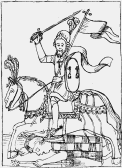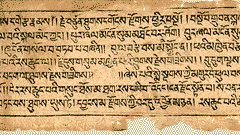| a r t i c l e s o n c o n v e r s i o n | ||
|
Missionaries
should respect Hindus' faith, way of life At a crossroads in Brooklyn, a young man asked me whether I would like to join the Kingdom of Heaven. After I took his pamphlets and walked on, I began to ponder his assumptions. Is there a kingdom of heaven? Is his the only one? Why is it not mine? How did he decide that his faith is better than mine? Who gave him the right to judge? These questions are being asked by millions of Hindus in India, whom Pope John Paul II and the Southern Baptist Convention have targeted for conversion to Christianity in this millennium. Perhaps that young man is convinced that his kingdom is virtuous while mine is vile. The process of vilifying other religions is an essential strategy for some Christian evangelists. For example, according to news service reports, a recent Southern Baptist guidebook stated that Hindus have "darkness in their hearts that no lamp can dispel." Southern Baptist literature also said that Hindus "worship gods which are not God."
Does Christianity preach that it is right to insult a neighbor because of the way he looks, dresses, speaks, or worships? Is the "love" in "love thy neighbor" qualified? Shouldn't a Christian love his neighbor irrespective of his color and creed? Why isn't the Christian happy if the neighbor becomes a loving and caring person by his ministrations? Why should the neighbor change his name and faith to become worthy of that love? In 1930, Mahatma Gandhi wrote: "Why should a Christian want to convert a Hindu to Christianity and vice versa? Why should not he be satisfied if a Hindu is a godly person? If morals of a man are of no concern, the form of worship in a form of church is an empty formula. Should not they work to see that a Hindu becomes a better Hindu and a Christian becomes a better Christian?" In the Sermon on the Mount, Jesus condemns religious hypocrisy by saying: "Judge not, lest ye be judged" (Matthew 7:1). Yet some Christians use the social evil of caste as a trump card to vilify Hinduism.
Societies practicing Christianity have been rife with inequality and injustice. Indeed, the disparities between landlords and peasants in Ireland and whites and blacks in South Africa before the repeal of apartheid and in America before the gains of the civil rights movement amply demonstrate this sad fact. For the past 200 years, Hindu reformers have been trying to rectify the injustice of caste and to that effect have instituted an affirmative-action program far stronger than Americans have done. Christian critics fault us for having too many gods and icons. Though many Protestant sects including Southern Baptists reject the use of images in worship, icons and statues abound in the Eastern Orthodox and Roman Catholic Christian traditions. During a visit to Europe, I saw icons, statues, and paintings of Madonna and Child and of saints and angels in many churches. And devout Christians knelt before these statues and lighted candles in front of them as Hindus do in their temples.
There is no problem if Christians preach their religion and people who truly have a change of heart convert. "Let your light so shine before men, that they may see your good works" (Matthew 5:16). But organized evangelization campaigns smack of religious imperialism. It does not remain a matter of religious freedom but becomes a question of cultural colonialism. In fact, the title of a book by Bishop James M. Thorburn, "Christian Conquest of India" (Eaton and Mains, 1902), succinctly captures the evangelists' mission in India. "The word should be passed all along the line that India is to be won for Christ," he writes. " . . . The young may rejoice still more in the hope of seeing a day when a million souls will be found inquiring the way to Zion in North India, a million in West India. . . . Why not ten millions? Why not the Christian Conquest of India?" I deeply admire Christian missionaries work with the poor and downtrodden in the world. Mother Teresa set standards of service that are worthy of admiration and emulation. What I oppose is organized evangelization campaigns, with their whatever-it-takes attitude to achieve conversions. Let us all work to breach the gap between the Gospel and the practice of religion. Let us make Hindus better Hindus and Christians better Christians, rather than convert them only in name and the form of worship. Let us learn about our neighbors and love them. Isn't the world a better place as a rainbow of colors, cultures, and religions than as a homogenized landscape of one color, faith, and culture? Different cultures, religions, and people give the world the beauty of fall. If everyone were the same, the world would assume the gray of a somber winter morning.
|
||
|
|
Copyright © 2001 - All Rights Reserved. |
|
|
a r t i c l e s o n c o n v e r s i o n |
||
|
|
||

 Philosophers and writers such as Thoreau, Emerson, and
Schopenhauer greatly respected the Vedas and Upanishads. But many Christians
shut their eyes to the beauty and wisdom of this ancient faith. They
painstakingly identify all the social evils that occur in the Indian
subcontinent and blame all that is wrong there on Hinduism. Pronouncements from
their pulpits, literature, and campaigns are reminiscent of the negative
campaigning that occurs in politics.
Philosophers and writers such as Thoreau, Emerson, and
Schopenhauer greatly respected the Vedas and Upanishads. But many Christians
shut their eyes to the beauty and wisdom of this ancient faith. They
painstakingly identify all the social evils that occur in the Indian
subcontinent and blame all that is wrong there on Hinduism. Pronouncements from
their pulpits, literature, and campaigns are reminiscent of the negative
campaigning that occurs in politics. The atrocities committed in the name of caste pale in
comparison to acts committed by some Christians. The horrors of religious
intolerance commmitted during the Inquisition speak for themselves.
The atrocities committed in the name of caste pale in
comparison to acts committed by some Christians. The horrors of religious
intolerance commmitted during the Inquisition speak for themselves. The most venerable Hindu scriptures, the Vedas, declare
that God is one but the wise call him by different names. Our gods are various
attributes of the same omniscient, omnipresent, and omnipotent God who is the
God of everyone else in the universe. Our liturgy is different, not deviant.
The most venerable Hindu scriptures, the Vedas, declare
that God is one but the wise call him by different names. Our gods are various
attributes of the same omniscient, omnipresent, and omnipotent God who is the
God of everyone else in the universe. Our liturgy is different, not deviant.